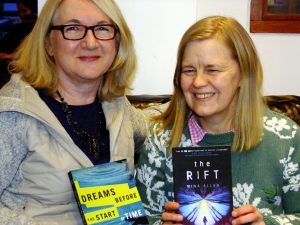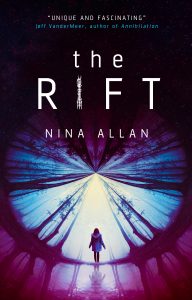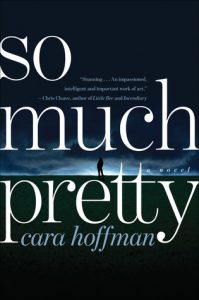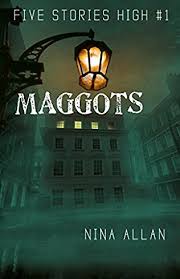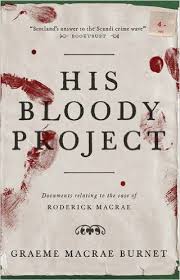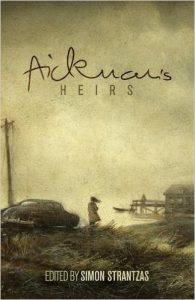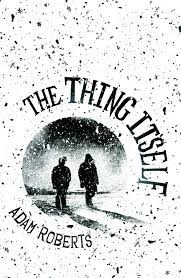 Of all the novels on this year’s Clarke submissions list, one of the most thought-provoking, intellectually ambitious and brilliantly executed must surely be Adam Roberts’s The Thing Itself. I hadn’t read this the last time I posted here about the Clarke Award, but I did shortly afterwards, and it seemed to me that here was everything British SF excels at. In its disgruntled, vaguely loser-ish protagonist seeking answers to dangerous questions, I couldn’t help but be reminded in a roundabout way of Rudi, the reluctant hero of Dave Hutchinson’s Clarke-shortlisted Europe In Autumn from the year before. A similarly distinctive, dare I say British irony was present, too, a shit-what-now?? tone of voice that works as the British answer to the slacker narrative, only with added fuck-you. Like Europe in Autumn, The Thing Itself is a very funny book, equally because of and in spite of its serious subject matter – once again, an approach that British writers seem to excel at.
Of all the novels on this year’s Clarke submissions list, one of the most thought-provoking, intellectually ambitious and brilliantly executed must surely be Adam Roberts’s The Thing Itself. I hadn’t read this the last time I posted here about the Clarke Award, but I did shortly afterwards, and it seemed to me that here was everything British SF excels at. In its disgruntled, vaguely loser-ish protagonist seeking answers to dangerous questions, I couldn’t help but be reminded in a roundabout way of Rudi, the reluctant hero of Dave Hutchinson’s Clarke-shortlisted Europe In Autumn from the year before. A similarly distinctive, dare I say British irony was present, too, a shit-what-now?? tone of voice that works as the British answer to the slacker narrative, only with added fuck-you. Like Europe in Autumn, The Thing Itself is a very funny book, equally because of and in spite of its serious subject matter – once again, an approach that British writers seem to excel at.
And yet Roberts goes further. Here is a novel that starts out riffing heavily off John Carpenter’s landmark movie The Thing but with a Red Dwarf vibe (there is a hilarious sequence concerning the bartering of a letter that is worth the cover price in and of itself, and recalls the dysfunctional relationship between Lister and Rimmer to the life) that morphs into a sinister techno-thriller and ends up as a scholarly meditation on life, the universe and everything. The thing itself, in fact. Interspersed with this twistiest of ongoing narratives, we have historical vignettes showcasing descriptive writing of a power and beauty Roberts only rarely allows himself to indulge in but clearly excels at. These stories within stories are rich in detail, evocative of time and period, and without exception deeply moving. That they turn out to be anything but tangential to the central storyline is just one of the joys awaiting the reader who lets this extraordinary book into their life. I’m not going to do the boring thing here, i.e fold my arms huffily and mutter questions to the house about why the hell was this novel not at the very least shortlisted for this year’s Clarke Award, because that would seem like shutting the stable door after the horse has bolted. But its omission does beggar the imagination, nonetheless.
Shortly after this year’s shortlist was announced, Roberts made a comment on one of Martin Petto’s interesting and highly relevant series of blog posts on the subject of the Clarke Award, in which he put forward a personal vision of what, in fact, the Clarke should be ‘for’:
“Namely I do think SF should be doing philosophy, and metaphysics…and indeed that the genre should be doing other things too: theology, for instance (though that probably is just me); law; economics: by ‘doing’ I mean extrapolating and dramatising and thought-experimenting and playing with… So, for example Francis Spufford’s excellent Red Plenty was a book about ‘doing’ economics as SF which was really interesting, and promising, and thought-provoking. But nobody seems to be following it up.
People say that awards should be jumping off points for genre ‘conversation’, and so they should. But that conversation needs to be about more than just ‘meat-and-potatoes SF versus literary SF’, and it should definitely be about more than prize committee procedure. If, that is, and as people are saying in this thread, we want the genre to remain vital.”
That The Thing Itself more than amply fulfils its author’s own vision for science fiction goes without saying – to paraphrase, Roberts takes one of the most famous dictums in Western philosophy and makes a speculative novel out of it, a novel that gives us adventure and relatable characters, even a frisson of terror, AND writing that could stand beside anything submitted for this year’s Booker, AND a philosophical underpinning genetically merged, Brundlefly-like, with an original and ingenious science fictional conceit. Which makes it all the more concerning to read what Roberts has to say about his own perceived lack of recognition in a piece at his blog, posted the day after the announcement of this year’s Clarke Award at a ceremony last Wednesday:
“In the larger sense of ‘SF’ in the round, my failure is a non-event, the very definition of a self-correcting issue—for if what I do mattered to SF then it wouldn’t fail, QED. The genre is currently in a place of rude strength and promise, and whether I personally succeed or fail is a perfect irrelevance to that. The only way in which it might be relevant is as an object lesson for other writers, and especially up-and-coming or would-be writers. A small constituency, but not an unimportant one. And as far as that goes, the moral is presumably: don’t do as I do. I’d boil this down to: don’t write novels that stray too far from the median of SF-Fan interest: don’t be too pretentious or clever-clever, don’t try to be too ostentatiously experimental or oddball. Of course, by the same token, I urge you: don’t be too middle-of-the-road or bland, don’t set out to write sell-out commercial pap. It’s a balance, as in so many things. Try to orient yourself—as I have, frankly, failed to do—in terms of where the genre is, and where it’s going.”
We can only hope that Roberts’s words here are front-loaded with at least a modicum of the irony that must count as one of his defining literary characteristics, because taken as it stands his advice is, to put no finer point on it, cobblers. Indeed I can think of no better advice to the ambitious writer of speculative fiction than to simply take Roberts’s words above and reverse their meaning: do do as Roberts does. Do write novels that stray far (very far) from the median of SF-fan interest: do dare to be pretentious and clever, do please for God’s sake try to be ostentatiously experimental or oddball. One of the joys of being involved in science fiction is ‘the conversation’, that thing that happens between writers, critics and fans when they discuss how science fiction’s past impacts (or not) on its future, how a new work may be a direct commentary on an older work, what the SF project ‘means’. A lot of the stuff that has a lasting impact though? Stuff that makes a kerfuffle. Writers who are perfectly aware of what’s gone before but who choose actively to give it the finger. It’s called evolutionary mutation, and it’s what keeps all art forms – not just science fiction – alive and relevant.
What Roberts goes on to say about the need for writers to promote themselves by showing up at cons and ‘pressing the flesh’, as he puts it, is also misguided. By all means, go to conventions if you enjoy them, they can be a lot of fun and there’s no doubt that they can be a useful way of making contacts. But we should never forget that for some writers, conventions are the very devil: exhausting, ephemeral, and most of all a distraction from the thing that matters most in being a writer, that is, an intense and sustained focus on one’s own work. In the end, it doesn’t actually matter two hoots what anyone else is doing. The thing itself is to articulate one’s own ambition, one’s own literary aims and subjective concerns – through writing. If the writing is the best you can make it, the rest will follow. That the timescale of success is often unfairly protracted is a pain in the arse, and occasionally dispiriting, but ultimately – insofar as literature is concerned – irrelevant.
None of this is to brush Roberts’s sense of disappointment aside. It is a matter of mystery and consternation to me that Roberts’s last three novels in particular, which are so clearly at the vanguard of the British SF project, have not been recognised by Clarke juries, especially when a more than comfortable number of those books that have been recognised in their stead have been so derivative. That Adam has not been invited as Guest of Honour to any of our conventions is not just a mystery, it is a ludicrous oversight and should be a matter of acute embarrassment for the entire SF community. One can only hope that this situation will be set to rights at the earliest opportunity.
Is science fiction, as Roberts contends, in a state of rude health? I would say yes. Never has science fiction been so pervasive, so present in popular culture and across all media. In the past decade especially we have seen science fiction exert a zeitgeist-defining impact on all branches and sects of literature, bringing to the forefront of public consciousness ideas, concepts, fears, hopes and concerns – not to mention forms of expression both digital and analogue – that were previously barely admissible as subject matter for serious fiction. Whether our science fiction awards adequately reflect that rude health is more open to question. Of course, we should never forget the sheer arbitrariness of awards, and I’m not just talking about fan awards. When it comes down to it, what is a juried award but five people in a room, arguing the case for their favourite books according to their own personal taste. Those people are not infallible, they’re not gods, and should therefore not themselves be judged too harshly for the decisions they happen to make in any given year.
What we all can affect though is the climate around an award. It seems to me that the climate around the Clarke has begun to shift, not towards ‘bad books’ but towards a centrist, conservative (not in the political sense but in the literary sense), broadly commercial view of science fiction: familiar tropes, satisfactory plots, median, unfrightening writing. Works that would not have looked out of place on a shortlist from twenty years ago, in other words. Much of the most interesting and progressive work is being ignored.
Is this shift towards the bland, towards the unprovoking at least partly down to the increasingly close, not to say incestuous association between reviewers and publishers, writers and fans, science fiction literature and its media counterparts? If I were to say yes, that would be an assertion made out of gut feeling rather than as the result of any concrete, gathered evidence. What I do know though is that a climate in which the directorship of a literary award does not seem to understand the value of literary criticism and intellectually engaged discussion around that award – to find it threatening, even – a climate in which certain online factions seriously put forward the argument that rigorous examination of a text might be seen as ‘unconstructive’ or even bullying is at best laughable, at worst severely damaging for our critical hinterland. Does this climate of wholesale, unexamined approbation eventually boil down to bland shortlists? I couldn’t possibly comment, but it does seem to me that any jury whose main criterion for selection would appear to be ‘did I enjoy reading this book?’ is unlikely to give us a shortlist to shake the firmament.
For a more succinct appraisal of the overall tenor of this year’s award, I 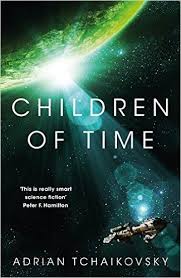 might point you towards From Couch to Moon’s excellent and insightful Clarke summary post, Surface, Contrivance, & Salience, in which she suggests that ‘perhaps most indicative of the mood surrounding the 2016 Clarke Award shortlist is that most of the discussion is about the Clarke Award itself, rather than the mostly baffling list of novels the jury selected this year’. One of the most heart-warming sights you can hope to see in SFF is that of a genuine and warm-hearted writer in full-on gobsmacked mode as they step forward to receive an award they clearly did not expect to win. I have not read Adrian Tchaikovsky’s Children of Time, but the commentary around it suggests that it is flawed but interesting, an exploration of some fascinating ideas within a context that, while largely familiar in terms of its science fiction, is distinct unto itself and seriously intended. There is nothing remotely to disqualify a book like Children of Time from winning the Clarke Award – indeed, there will be many who will argue that Tchaikovsky’s novel is the most overtly ‘Clarkeian’ winner in some years. Great – and I say that entirely without irony. But I would be even happier for Adrian if his novel had been forced to argue its position, its interpretation of the SF project against some more aggressively dissimilar standpoints, if it had arisen from a shortlist offering more robust competition.
might point you towards From Couch to Moon’s excellent and insightful Clarke summary post, Surface, Contrivance, & Salience, in which she suggests that ‘perhaps most indicative of the mood surrounding the 2016 Clarke Award shortlist is that most of the discussion is about the Clarke Award itself, rather than the mostly baffling list of novels the jury selected this year’. One of the most heart-warming sights you can hope to see in SFF is that of a genuine and warm-hearted writer in full-on gobsmacked mode as they step forward to receive an award they clearly did not expect to win. I have not read Adrian Tchaikovsky’s Children of Time, but the commentary around it suggests that it is flawed but interesting, an exploration of some fascinating ideas within a context that, while largely familiar in terms of its science fiction, is distinct unto itself and seriously intended. There is nothing remotely to disqualify a book like Children of Time from winning the Clarke Award – indeed, there will be many who will argue that Tchaikovsky’s novel is the most overtly ‘Clarkeian’ winner in some years. Great – and I say that entirely without irony. But I would be even happier for Adrian if his novel had been forced to argue its position, its interpretation of the SF project against some more aggressively dissimilar standpoints, if it had arisen from a shortlist offering more robust competition.
If it had been up against The Thing Itself, for example, or Matthew de Abaitua’s equally achieved If Then, Anne Charnock’s needle-fine and determinedly questing Sleeping Embers of an Ordinary Mind. You will notice that all three of the novels I’ve cited here are what would be broadly defined as being ‘of SF’, i.e they are written unironically as science fiction novels, not as metaphorical ‘pirating’ of science fictional concepts to illustrate mainstream literary ends. Earlier in the season, Paul McAuley posted an interesting essay at his blog in which he explored the meaning and merit of these opposing constructs, but his veering towards a bipartite ‘literary versus genre’ model runs the risk of driving the argument into a cul-de-sac. As Adam Roberts insists above, the conversation needs to be about more than meat-and-potatoes SF versus literary SF. We already know that beautiful prose is not the sole prerogative of so-called ‘literary’ writers – writers such as Sofia Samatar, Lucius Shepard, Chip Delany, Michael Swanwick, Kit Reed, Carol Emshwiller all sit firmly within the genre and have given us some of the most poetically stylish prose around. We already know that beautiful prose is not the point – because articulacy, originality, seriousness and literary daring can be clothed in whatever kind of language the writer wants to use. And because beauty is, after all, in the eye of the beholder. To insist, as McAuley seems to, that ‘great works of science fiction, works worthy of the Clarke Award, shouldn’t be judged by the same standards as literary fiction’ equally begs the question: by which standards then should they be judged? I’m intrigued by McAuley’s definition of science fiction as a literature that, ‘rather than exploring reality…is interested in exploring the limits of reality. Rather than analysing and universalising individual human experience, it’s interested in analysing the reality of the universe and measuring it against human values. It’s about change and difference, and the consequences of change and difference’. As a starting point for discussion, this analysis is valid and useful. But when it comes to arriving at a consensus as to how well a particular text has fulfilled its brief not simply as science fiction but as a novel, then surely we must judge it by the same standards as we might judge, say, Eleanor Catton’s Booker-prizewinning novel The Luminaries. We would be letting it off the hook otherwise, making allowances. I would argue that the greatest science fiction needs no allowances made.
As noted above, there seems little point in rehashing what might have been, but surely we must seriously ask ourselves where to now? What can be done to drive the Clarke Award in a more challenging and innovative direction? One could argue nothing – when all is said and done, it’s just five people in a room picking their favourite books. One could equally argue that it’s not just up to the judges, it’s up to everyone who cares about science fiction and the science fiction conversation to ensure that the climate around the award is not just roundly, blandly enthusiastic but also knowledgeable, questioning, engaged, and yes, argumentative and occasionally contentious, a climate in which debate is not just grudgingly tolerated but warmly encouraged and even (gasp) promoted.
Would it help if the jury had a more precise remit, something along the lines of the Kitschies’ ‘most entertaining, progressive and intelligent’ as opposed to the diffuse and catch-all ‘best’ that currently heads the Clarke’s submissions guidelines? It’s an idea.
Would it be useful if jury members could – again, like the Kitschies judges – be selected from across a wider demographic instead of just the BSFA, SciFi London and SF Foundation memberships, many of whose most experienced critics have already served their maximum two terms? It’s an idea.
Would it perhaps also be an idea to have a division of labour between the person responsible for the commercial directorship of the award – I don’t think anyone would deny that the current incumbent, Tom Hunter, has been highly motivated and successful in this role – and an appointed ‘artistic director’, a science fiction ambassador who could be responsible for blogging the award, commissioning articles, collating reviews and commentary, liaising with convention committees to promote discussion around the award in general and the shortlisted books in particular? Again, it’s something worth thinking about.
2016 has been hailed as the year that the Clarke Award committed itself to opening up the award to self-published writers. This has been couched in such a way as to make it appear as a radical and dynamic step towards making the Clarke Award more diverse and inclusive. To my mind, it’s a bit of a sideshow, a move that at best achieves precisely nothing, and at worst bulks up an already hefty submissions list with substandard work. It is interesting to note that the two works put forward as justification for this new policy, Becky Chambers’s The Long Way to a Small Angry Planet and Jeff Noon’s Channel Skin, both provide deft examples of precisely these two scenarios. The Chambers book was picked up by a commercial imprint (Hodder) less than twelve months after its original appearance as a self-published work, thus making it eligible within the normal remit the following year anyway (when, as we all know, it made its way directly to the shortlist). The Noon book, whilst demonstrating a wealth of original ideas and imagery, did not read like a fully worked out novel – more like notes for a novel – and one can easily understand how, even with Noon’s name attached, it would have struggled to find a publisher willing to go in to bat for it. Jeff Noon exudes ideas like perspiration (not the most glamorous of images, but given Noon’s fondness for bio-SF I’m sticking with it) and it’s fantastic to see him back in contract again with Angry Robot – I wouldn’t be at all surprised to see A Man of Shadows in hot contention for the 2018 Clarke. But Channel Skin? Noon is a one-off case anyway. The truer fact remains that any self-published novel worthy of consideration is going to get picked up for wider distribution sooner or later (Chambers, Weir, Howey, Charnock), and whilst the independent press is becoming an ever-more-valuable proving ground for emerging writers, I really cannot see the value in opening the Clarke to self-published works that have been subject to little if any objective scrutiny en route to ‘publication’, where for the vast majority of novels that fall into this category, publication = printing but nothing more.
A move that’s good for grabbing the headlines then, but of little practical value beyond that moment.
The greatest thing about this year’s Clarke Award has been the debate it has engendered, and at this point I would like to express my appreciation of From Couch to Moon, Tomcat in the Red Room, Gareth Beniston, Maureen Kincaid Speller, Jonah Sutton-Morse, Paul McAuley and most especially Abigail Nussbaum for their marvellous and inspiring contributions to those discussions. You can find links to all their reviews and summations at the (equally brilliant) Martin Petto’s blog, here. It is writing like this, thinking like this, that will continue to ensure not just the longevity of the award but its literary relevance. Without the people who argue the toss, an award is nothing, just one more cocktail party in the publishing calendar. Let’s keep it coming.
